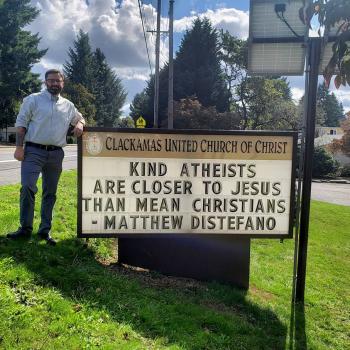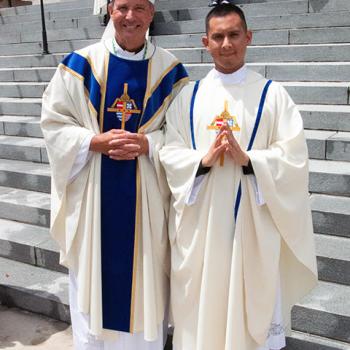
Last month, my esteemed editor (hey, Travis!) asked that in this month’s article I tackle the nice, easy question, ‘What is the most pressing issue facing your faith community?’
There are many possible answers I could have given, but after thinking about it I chose to focus on global partnership.
Anglicanism, the tradition that I belong to, has always placed a strong emphasis on the surrounding community: the parish on our doorstep. There is no conflict, however, between our duty to local people and a sense of our place in the world.
Whenever Northern Ireland folks need to find out more about something, we meet someone for a cup of tea – has to be tea! – who has the knowledge; and so, to Belfast, where I chatted with my dear friend Emma Lutton about her important work. Emma currently serves as Communications Coordinator for Church Mission Society (CMS) Ireland.
Why Should Global Partnership Matter to the Church?
The ‘M’ in CMS Ireland is for ‘Mission’; and so, that’s where my conversation with Emma begins. For anyone looking at it in historical context, ‘mission’ can be quite an uncomfortable term – associated, as it has been with colonialism. ‘It comes with a lot of baggage’, observes Emma, ‘and a lot of assumptions that many still hold today’.However, Emma believes that ‘mission’ is a word that, despite the burden of history, deserves to be reclaimed and reframed: ‘God’s mission is to restore a right relationship between God and humanity.’ Therefore, she reflects, ‘it’s not our mission; it’s God’s mission’.
Speaking of terms rich in meaning, Emma then uses the phrase, ‘reciprocal flourishing’, which I thought was just great – so much so that I’ve used it in the title! But what is ‘reciprocal flourishing’? It’s when Christians from different places dialogue and share life with one another, says Emma, ‘gaining, listening, and learning’ in the process.
When God’s people from all over the world come together, Emma reflects, we’re able to ‘see the Body of Christ in all its wonderful diversity and difference’; and while sometimes there might be ‘tensions’ and ‘challenges’, there is ‘richness and joy’ that we can’t access from within our own bubbles.
Furthermore, we have a chance to ‘learn a lot about our own prejudices and struggles’ when we come together as a global church. ‘God might be telling us about our own hearts in those contexts’; and that, Emma tells me, brings with it ‘a real opportunity for us to grow’.
Challenging as it might be, we can be called on to question our cultural prejudices, ‘the things that we assume to be the norm’, when we come into contact with people from other places and realise that how societies are structured can be ‘very culturally bound’.
Emma sums up this part of our conversation beautifully when she says, ‘Faith lived out in community is essential because we can learn from one another’; and God knows there is plenty for us to learn!
What are Christians Doing to Advance Global Partnership?
There is quite a lot of information online about CMS Ireland, but Emma does a good job summing up their main goals: ‘We, as an organisation, are helping to facilitate transformational relationships between folks here and folks elsewhere’; elsewhere, according to the CMSI website, includes a host of different countries like Burundi, the DRC, Kenya, Nepal, South Sudan, and Zambia.CMS Ireland clearly values what its global partners have to say. ‘What we are trying to do’, says Emma, ‘is bring our partners and various clerics over so that we can really learn from them; and that relationship then becomes more established, and richer, and deeper’.
Anglican Church structures have been helpful to CMS Ireland in establishing new partnerships around the world. (You can well imagine that I was delighted to hear this!) ‘We’re working alongside very well-established structures that are robust and allow us to feel really confident’, Emma tells me.
She was keen to stress that while CMS Ireland has a network of Anglican partners (and, as an organisation, has Anglican heritage), it strives to serve ‘the full breadth of the Church’. Nevertheless, having a denominational framework to collaborate with means that when CMSI wants to build a new partnership somewhere they don’t have to start from scratch.
Global partnership, however, isn’t something that only takes place abroad. ‘Mission work happens here’, says Emma, ‘We have the global Church on our doorstep now’. This means that we can experience ‘the joy and beauty’ of the worldwide Christian family right here, too, ‘something that enriches all of our lives’.
How Can Believers Get Involved in Global Partnership?
Emma and I wrapped up our conversation on a very practical note: with some calls to action that we can all pursue.‘One of the ways that I want to encourage people to get involved’, Emma suggests, ‘is through our teaching resources for children and teens’. I, for one, am excited to bring them into Sunday school when we reconvene in September!
There is one about social justice and climate, Switched On, that I really love. But how does creation-care fit into the concept of global partnership that we’ve been talking about? ‘Many of our partners’, notes Emma, ‘face all kinds of climate emergencies. Issues of climate injustice are really what have motivated us [at CMSI] to look at this’.
Recent cuts to foreign aid budgets are, after all, having a serious impact on efforts to fight climate change around the world.
Switched On is based on a Bible verse from St Paul’s letter to the Galatians: ‘Bear one another’s burdens and so fulfil the law of Christ’ (6.2). ‘If climate injustice is the burden of our fellow human beings’, explains Emma, ‘then it needs to be our burden too’.
CMS Ireland, at a more intimate level than the massive question of climate change, puts congregations in different parts of the world in contact with one another. They become ‘link churches’, participating in God’s mission together. CMSI works as ‘a kind of lynchpin’, Emma tells me, ‘to help that relationship flow and work well’.
Final Thoughts
Mission is a frame of life rather than one particular action (or set of actions). ‘It’s a part of all of our lives, all of the time’, says Emma. Let me finish with a lovely reflection from her:‘If our whole lives are lived trying to attend to what God would have us do in our practical living, and in our headspace, then that’s when we get closer to that right relationship between God and ourselves and a right relationship between God and humanity’.
The world around us, and our future in it, has never depended more upon this vision than it does today. Thanks, Emma, for talking to me!
7/14/2025 10:39:55 PM





